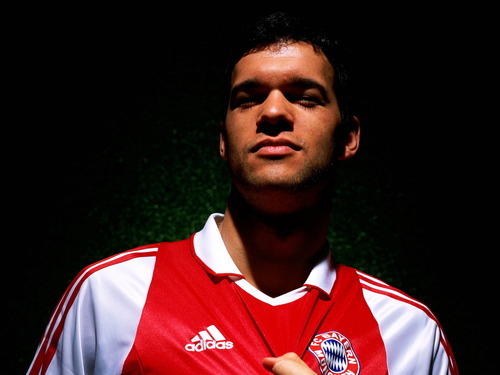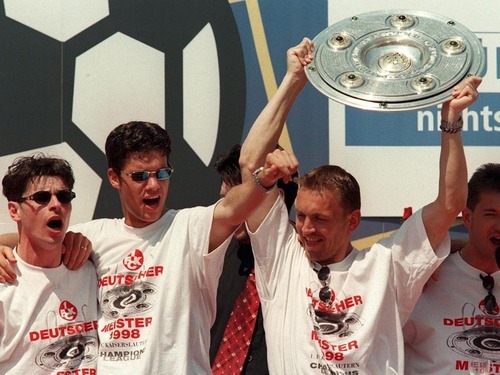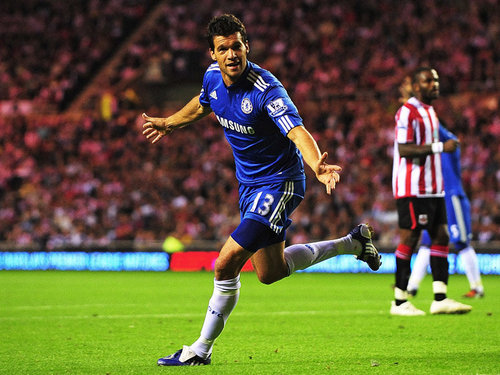We bid farewell to a German class act, Auf wiedersehen Ballack
We bid farewell to a German class act, Auf wiedersehen Ballack


By Ross Dunbar
Michael Ballack has been rarely missing from the forefront of German football. But this week, the 36-year-old brought an end to a stunning 17-year senior playing career, despite public interest from clubs spread across the globe, including those in North America and Australia.
Speaking on behalf of a statement released by his agent (Michael Becker), Ballack said: “At the age of 36, I can look back on a long and wonderful time in professional football. As a child, I could never have even dreamt of having such a career. It was a privilege working with first-class coaches and fantastic teammates. Of course, I am going to miss running out in front of 80,000 spectators or scoring goals.”
“The last few months without playing football have shown me that the time had come to give it up. I am now looking forward to the next chapter in my life and would like to thank my family and all the amazing people who have supported me, pushed me and accompanied me. They have made a major contribution to my success.”
Ballack’s relationship with football goes back to his early years, making his first strides in the game with Chemnitzer where he completed his senior debut for the club at the age of 19 in the 2.Bundesliga. The midfielder is renowned for his prolific ability to score goals from the middle of the park but in his first campaign as a professional, he was deployed in a more-defensive midfield-role, gaining plaudits for his excellent ball control and passing.
It was one of the country’s most experienced coaches, Otto Rehhagel, who was impressed with the youngster, bringing him to FC Kaiserslautern. Ballack had to fight for his place at the Betzenberg in a competitive environment, where FCK would go on to clinch their first-ever Bundesliga championship in 1998. Ballack soon became an integral part of that historic squad, earning a place in the heart of the midfield – and the respect of Rehhagel.

And it was just a matter of time before Ballack would continue his rapid ascent to the top of European football. Bayer Leverkusen spent around €4m for the player, 22-years-old at the time. But his departure from Kaiserslautern was controversial, having rejected a contract offer from the club, amid irregularities in Leverkusen’s contact with Ballack.
Bayer Leverkusen made Michael Ballack, as we know him now. The midfielder moved into an advanced position, creating a fantastic relationship with Leverkusen stars Carsten Ramelow and Bernd Schneider in the team. It was Christoph Daum, initially, who opted to move him in further forward and responded with 7 league goals in the he netted 9 goals in the 2000-01 season, before the shrewd Klaus Toppmöller continued the trend.
Toppmöller, speaking in March 2012, spoke about the importance of Ballack, against the likes of Barcelona – who Bayer were set to face in the Champions League - whilst he was on the sidelines, and his part in Leverkusen’s successful side of 2001-02.
“Michael being in such a game is decisive.” Toppmöller explained to RP-Online. “He is someone who can lead. But he does not get the necessary confidence. He can hardly be worse than the younger players. Without Ballack, there is nothing for Leverkusen in the Champions League.
“When I was in Leverkusen coach, I’ve always been close with him: What do we do on the pitch, if this or that happens? Jens Nowotny was indeed the captain, but I talked with Michael many times.”
On his retirement, he added: “A footballer with his career deserves a dignified farewell. The club should have given him more.”
Ballack’s Leverkusen career went from the extraordinary, to the ridiculous, to the unfortunate. Die Werkself looked a certainty to win the Bundesliga in the year of the new millennium, only requiring a draw against the lowly Unterhaching to win the title on the last day of the season. The midfielder, though, scored an own goal as Leverkusen slumped to 2-0 home defeat and surrendered the championship to FC Bayern.
Two years later, Leverkusen suffered more heartache – despite a generally, outstanding campaign – losing the Bundesliga crown to Borussia Dortmund in the last few weeks of the season and then, the DFB Pokal to Schalke 04. Leverkusen could hardly believe their luck and Ballack inspired the Germans to the UEFA Champions League final in 2002, missing out in the final thanks to an incredible strike from Zinedine Zidane in Glasgow.
Entering his peak at the age of 26, FC Bayern forked out around €13m in 2002 - following his decent displays at the FIFA World Cup in Korea/Japan – to take him to the biggest club in Germany. Like at the BayArena, his spell in Bavaria would come to an abrupt end, four years later, taking criticism from the ‘FC Hollywood’ hierarchy for his inability to perform in bigger matches.
The statistics do not back that up, of course. Ballack won three Bundesliga titles at FC Bayern, three German FA Cups and retained the ‘German Football of the Year’ honour, having also won it the season previously with Leverkusen. The midfielder was quickly finding his habit for scoring goals, hitting 10 in 26 league matches in his first campaign.
His domestic form for FC Bayern in 2005-2006 took Ballack to the highest stage in football, the FIFA World Cup in his home country. The 30-year-old scored 14 league goals for the Bavarians in the lead-up to the tournament and was a regular under Jurgen Klinsmann, Germany’s new head coach.

Ballack swapped Germany for England, joining Chelsea in 2006 where he made a total of 167 appearances for the Blues and collected another plethora of awards. The midfielder formed a strong bond with the Millennium Stadium in Cardiff, the temporary home of English domestic finals. He collected three FA Cups at Chelsea, an English League Cup, the Community Shield, as well as the 2009-10 Premier League in a season in which he made 32 league appearances.
He returned to Bayer Leverkusen in 2010 – at the age of 34 – but his time at the BayArena was short-lived. He made just 35 Bundesliga appearances in a tenure that was spoiled continuously with persistent injuries.
Ballack’s contribution to the nationalmannschaft is a special one, too. The East German-born player scored 42 goals in 98 international caps, including 3 at the 2002 World Cup, 1 at Euro 2004 and 2 Euro 2008. To cap off a superb impact in the sport, FIFA named him one of the ‘100 greatest living players’.

Overall, Ballack had an incredible 585 appearances in all competitions and scored 145 goals in total at club level. His 79 Bundesliga strikes place him as the 85th all-time top scorer, which is a pretty exceptional record for a midfielder who was only converted to an attacking-player in his mid-20s. To summarise, besides being a goalscorer, Ballack was a leader with a huge presence for both club and country, a midfielder who consistently performed with class and quality. And he is one unluckiest players of the early 21st century, having lost all finals in 2002.
As Herr Toppmöller commented, around seven months ago, Ballack deserves immense recognition and can walk out of the game with his head held high.
This piece was written by Ross Dunbar, who frequently writes at who writes at Bundesliga Football.You can follow him on Twitter at @rossdunbar93. Comments below please.







